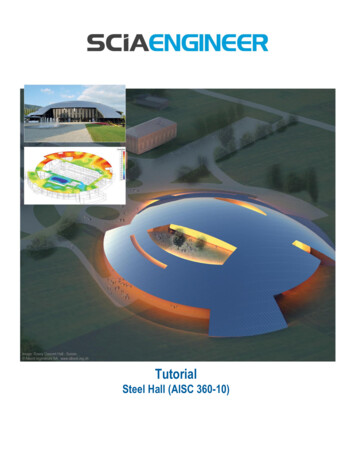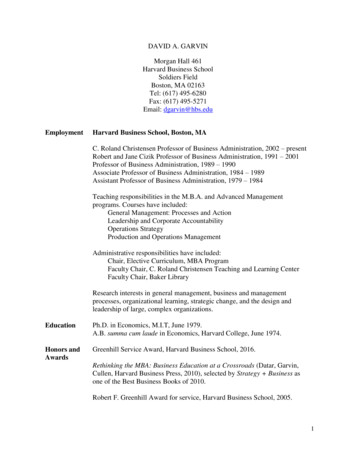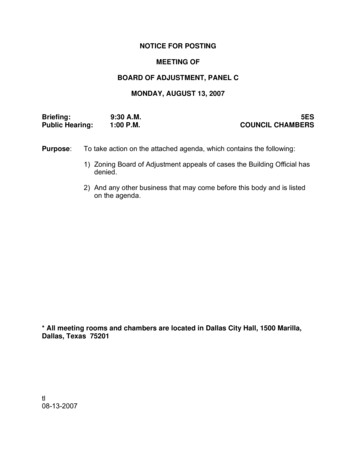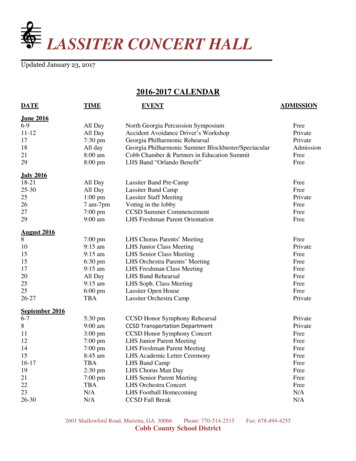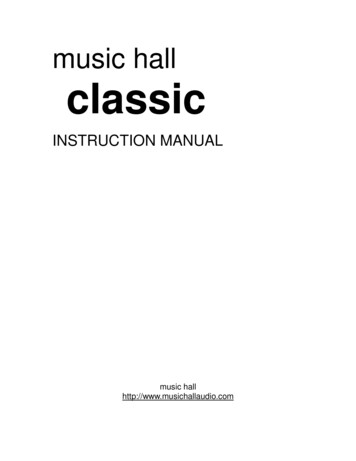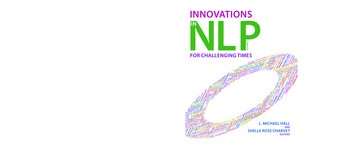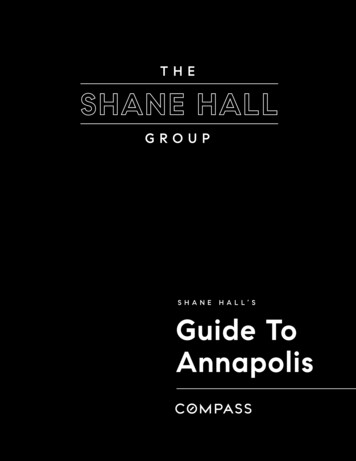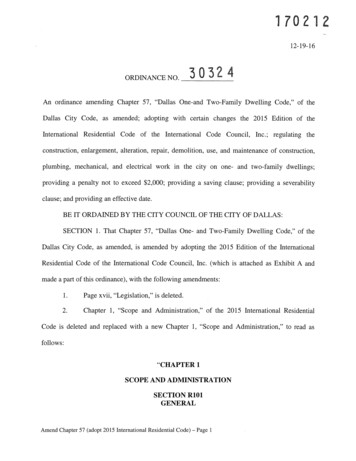
Transcription
International Journal of Humanities Social Sciences and Education (IJHSSE)Volume 7, Issue 1, January 2020, PP 37-41ISSN 2349-0373 (Print) & ISSN 2349-0381 04www.arcjournals.orgUnity: The Hall Mark of IslamDr. Sulaiman Sheu Adua1*, Dr. Moshood Atanda Hadi21Department of Religions, History and Heritage Studies, Kwara State University, Malete2Department of Islamic Studies, Kwara State College of Education, Ilorin*Corresponding Author: Dr. Sulaiman Sheu Adua, Department of Religions, History and HeritageStudies, Kwara State University, MaleteAbstract: The Islamic community in Nigeria and indeed world-wide is today bedeviled with the problem ofdisunity. The Nigerian sectors of the Ummah-shares a big portion of global disunity. Disunity robs Muslimsof many things and puts them at a disadvantage. Worse still, it brings about the exact opposite of the kind ofa community that Allah wants us to be (Q3: 103). More so, when the Hall Mark of Islam is Unity. What thenis responsible? How could this problem be solved? The crux of this paper is to attempt answers to thesequestions and proffer possible solutions to disunity among the Muslims by upholding the mantra: “The HallMark of Islam is Unity”.1. INTRODUCTIONIslam, a one time powerful religion that impacted on the whole worlds, is today at the crossroads. TheMuslims today find themselves in a state of siege, gripped by ignorance and despondency, disunity,hopelessness and apathy, discord and disarray, struggling to get guidance from “those who have goneastray”. One may ask the simple questions that started agitating the people’s mind about thedifferences which are noted among some Muslim scholars, students or Ummah in general: Why can’twe organize ourselves or carry out some of our actions uniformly? Why do we have these apparentdifferences in most of our festivals and so on. The answer is simple. Whatever appears to bedisagreement among Muslims is a normal phenomenon. Islam has been the religion of a thinkingpeople, i.e. the intellectuals; so, one is bound to find divergent opinions on some minor issues. As tothe major practices, the Muslims are directed by Allah to be unanimous by holding the rope of Allahtogether “And hold fast by the covenant of Allah all together and be not disunited”. (Q3: 103). It isagainst this background that this paper attempts to place on record that the Hall Mark of Islam isUnity.2. CONCEPT OF UNITY IN ISLAMUnity according to wiktionary.org is related to oneness, meaning: the state or fact of being oneundivided entity or a single undivided thing, seen as complete in itself.Brotherhood and unity in Islam are twin concepts that mutually reinforce each other to sustain ahuman model of the message of Tawhid on earth. Brotherhood ensures the bond of love, affectionand concern in such a way that a believer sees another fellow believer the way he sees the image inthe mirror that he faces: he would want for his fellow believer what he would want for that image inthe mirror he faces, that is, himself. While brotherhood ensures the affectionate bond for the sake ofthe creator, unity ensures the pursuit of common goals of the Ummah that marches towards thefulfillment of the purpose of creation. The fraternal bond of believers according to El-Miskin (2009) isarticulated by Allah Himself. It is manifested through practical correlatives of participation incommon worship patterns backing up the divine articulation. It is also sustained through consciousefforts by believers to ensure the cohesion of the Ummah.El-Miskin further elucidated that when Allah establishes the fraternal bond among believer (forinstance in Qur’ãn 3: 10), it is meant to be a transcendental linkage that cuts across bounds; Heexplains that, while it is an admonishment, it is a declarative articulation not subjected to negotiationor compromise. As long as one is a believer, he must subscribe to this intra-Ummah fraternal bond.International Journal of Humanities Social Sciences and Education (IJHSSE)Page 37
Unity: The Hall Mark of IslamThe declarative admonition of the Ummah’s fraternal bond is reinforced by a qualitative appraisal ofthe Ummah’s cohesive unity. The qualitative appraisal is encapsulated in a tripartite identity patternthat makes it the best community ever brought forth to this planetary entity, because its individualconstituents and collective entity: (i) admonish that which is good (ii) prohibit that which is wrong,and (iii) believe in Allah. In his Summation, El-Miskin beliefs that this qualitative appraisal of theimportant bond constructed with the building blocks of faith that brings together diverse humanelements within a single cohesive Ummah entity is both a reinforcement of the bond and a rationalethat instills in the believer that this community called the Ummah is the best entity to belong to(Qur’ãn 3: 110).3. UNITY: THE HALL MARK OF ISLAMThe Muslims in the world over believe in the oneness of Allah. So central is this fact to one’sprotestation of faith in Allah that the least derogation from it is an inexplicable sin that no extenuatingcircumstance can justify. The Qur’ãn says:Allah forgiveth not that partners should be set up with Him, but Heforgiveth anything else, to whom He pleaseth; to set up partners withAllah is to devise a sin most heinous indeed. (Q4: 48).The Muslims are united in this belief. Even the weakest in faith who may be guilty of violation ofAllah’s command does not robustly impugn the oneness of Allah. Abdalati (1982) says: Islam is based on unshakable belief in the oneness and universalityof God –the worshipped, the unity of mankind -the worshippers, andthe unity of religion-the medium of worship.For the Muslim, God is one, Eternal and universal. He is the creator of all men, the provider for allmen, the judge of all men and the Lord over all men.The institution of Salat (obligatory daily prayers) has the intendment of creating unity in the lives ofMuslims. Apart from the uniformity in the way and manner prayers are observed, they make socialintercourse possible and easy. In order to encourage such social intercourse, prayers saidcongregationally are rated twenty-seven times better and more rewarding than the ones said alone.Muslims thus meet congregationally in their different locality five times everyday of their lives. AbuHurairah reported that:The messenger of Allah found some people keeping away fromcongregational prayers and he said: “I intend to order someone tolead the people in prayer while I go to burn the houses of the peoplewho do not join the congregational prayer''. (Muslim).The scholars are in agreement that it is in the pursuit of the expansion of the unity in Islam that on aweekly basis the mosques for the five daily prayers collapse into one bigger congregation for theFriday service. This is no mere ritual; it is to drive home the sameness and oneness of our humanity.The two Ids enable us to realise, on a greater scale, our ambition of a united humanity. The concourseprovides not just the opportunity of meeting twice in a year, but summons attention to the fact that weare one humanity with a common destiny realizing the ultimate unity of Allah.The Institution of Fasting provides a yet providential platform for the concept of Islamic unity. Inaddition to its spiritual dimension, fasting plays an equilibrating role in the life of the Ummah. Thevery rich and the penurious that are divinely juxtaposed in all human communities go through thesame process of seeking to tame and domesticate the desire for food and drink. Whereas, for the poor,it is a continuation of the miserable existence to which they are used, the rich are reminded of thedaily experience of the poor. When they thus become solicitous for the poor, subsequently, they helpin redefining the common humanity of all.The Zakah institution is yet a very unifying element in Islam. By Allah’s design some person arehugely endowed with material opulence while others struggle to survive. This dichotomy is not juststudious; it is equally purposive. Ours would have been a world saturated with some hubristictendencies if resources with all existed in equipoise. It would have been a terrifying world to live in.Zakah provides the link. The giver gives without necessarily enslaving the receiver, while the receiverInternational Journal of Humanities Social Sciences and Education (IJHSSE)Page 38
Unity: The Hall Mark of Islamdoes not deify the giver. Each provides a basis for the fulfillment of Allah’s command. Love in itsundiluted and imperishable state becomes the by product of this exercise. The poor and the rich areunited as both actors are witnesses of this divine process. Furthermore, the hemlock which is thedesire to accumulate wealth and peculate what is collectively owned is cauterized. Little wonder thatthe stench of corruption (like the one in Nigeria today) is much more potent among those who do nothave this Islamic value. Because of the role Zakah plays in cementing the relationship betweenmembers of the Islamic Ummah, it was a justificatory basis for Abubakr to go to war with those whosaw the demise of the Prophet (S.A.W) as a golden opportunity to go back on the payment of Zakat.Hajj is one of the noblest institutions that Allah has blessed humanity with. Its role in enhancing unityin Islam is incapable of any explication. It is simply an exhilarating experience. It is the only singleevent that brings people from different backgrounds and orientations together. It has the kind ofcrowd that no other gathering can boast of. Shariati (n.d) describes the Hajj thus:In essence, Hajj is man’s evolution towards Allah. It is a symbolicdemonstration of the philosophy of creation of Adam It may bestated that the performance of Hajj is a simultaneous show of manythings; it is a “show of creation”, a “show of history”. A “show ofunity”, a “show of Islamic ideology” and a “show of the Ummah”.Hajj is a lesson in leadership. It tells us that a leader that is disdainful of the responsibilities that are anatural corollary of the privileges enjoyed, instigates and unmitigated humanitarian cataclysm. Itinstructs leaders to transform heterogeneous grounds into homogeneous ones. It is extrication fromfragmentation and relativity to unity. In Hajj, one realizes the veracity of the oneness of mankind asstated in the Qur’ãn. One observes that the greed and lust of man are responsible for the desire to holdmankind divided. The Qur’ãn says:Mankind was one single nation. And Allah sent messengers withglad tidings and warnings; and with them, He sent the Book in truth,to judge between people in matters where in they differed; but thepeople of the Book after the clear signs came to them, did not differamong themselves except through selfish contumacy. Allah by HisGrace guided the believers to the truth (Qur’ãn 2: 213).The above institutional framework in Islam for unity, is no doubt a clear indication that the Hall Markof Islam is unity, unity of faith, unity of action, unity of purpose and unity of thoughts.4. COG IN THE WHEEL OF UNITY AMONG MUSLIMS IN NIGERIANAsunogie Esq (2009) identified the following four major causes of disunity among Muslims: Lack ofknowledge of the Din, Ego, tribalism and greed.4.1. Lack of Knowledge of the DinHe observes that it is sad that a religion, to which scholarship is vital, is today populated by ignorantadherents. This vast army of ignorant followers has provided a source for recruiting those who fanthe embers of disunity. On this, the holy Prophet (S.A.W) has provided a clear guidance when hesays: “I am bequeathing two objects to you, and you will never go astray as long as you hold themtogether: the book of Allah and my Sunnah” (i.e. his tradition). It is from these two that Islamic lawderives its primary source, the Qur’ãn and Sunnah. The Muslims have a uniform application on thesetwo first sources. The secondary sources of law are the Ijma’a (consensus opinions of scholars) andQiyaasi (the analogical deductions of the Muslim scholars. These are the areas where intellectualinterpretation plays its role, and some people who cannot comprehend the reason for the divergentopinions of the Ulamac, feel there is disunity among the Ulamac whereas, there is none at all.In another approach, let us understand that Islamic Fiqh (jurisprudence) operates under what we knowas Fareedat, Sunnah and Mustahab i.e. compulsory, necessary Sunnah of the Prophet and thepreferable actions of the scholars. These are the normal applications on our Ibaadat i.e. act ofworship. All Muslims are unanimous on the fareedat and Sunnah but they have different opinions inrespect of Mustahab. Likewise, we have four orthodox Imams in Islam. They are Imam AbuHaneefa,ImamMalik, ImamShafici and Imam Hanbali (R.A.A), they only have divergent opinion on Mustahabissues, so it should not be construed that the Ummah is divided, as long as there is no controversy inthe fundamental issues of faith.International Journal of Humanities Social Sciences and Education (IJHSSE)Page 39
Unity: The Hall Mark of Islam4.2. EgoEgo is yet another problem. Every Muslim wants to be a Lord unto himself. The mushrooming oforganizations in the name of Islamic propagation is a proof of this untoward development.4.3. TribalismThe North/South dichotomy is yet a serious problem threatening unity in Islam. The feeling of thesuperiority of one tribe over another is unhealthy. Owing to historical factors, the distribution ofMuslims in the country is not even. Yet, they are found in every part of the country, among diverseethnic groups: Hausa, Fulani, Kanuri, Yoruba, Nupe, Edo, Igbo etc. It is therefore a big mistake toclaim that Nigeria is Muslim North and Christian South.4.4. GreedAt the heart of the problem of unity in Islam is the unbridled greed on the part of those whomasquerade as leaders.5. CONCLUSIONFrom the foregoing discussion, it has been established that unity is primal to Is
elements within a single cohesive Ummah entity is both a reinforcement of the bond and a rationale that instills in the believer that this community called the Ummah is the best entity to belong to (Qur’ãn 3: 110). 3. UNITY: THE HALL MARK OF ISLAM The Muslims in the world over believe in the oneness of Allah. So central is this fact to one’s
